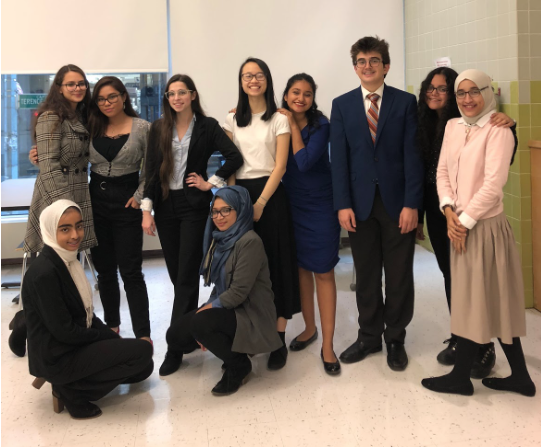Debate Team Hits Ivy League for Tournament
“We are pretty good at making compromises and criticizing ideas, not the people who have the ideas,” Annie Berger ’20 said of the debate team.
By DENISE MARTINEZ and
JAMIE SERRANO
After getting a taste of the Ivy League atmosphere at the Yale Invitational Debate Tournament September 14-18 in New Haven, CT, the debate team is preparing for upcoming competitions at Princeton and Harvard. The world of competitive debate is proving to be stimulating, challenging, and rewarding.
The Yale Tournament represented only the first or second time debating in varsity for many members of the team.
“I was definitely nervous, especially since this was my second time in varsity,” Leslie Pantaleon ’20 said. “However, I have learned to put that aside for the best interest of the debate.”
On the other hand, some competitors felt at ease as they were getting closer to the tournament.
Debater Anthony Lekakis ’20 said he felt “totally chill,” and Helen Chung ’20 said, “I felt okay. I accepted my fate.”
At Yale, the debate topics given connected multiple “perspectives of the United States, Russia, and China about what is going on today and the controversies that are rising,” debater Eleni Karoutsos ’20 said. Debate allows students to further explore different countries to get a better in-depth knowledge of foreign perspectives that will be helpful to use in rebuttals against other students’ arguments.
Once wholly settled at the tournament, the team started to feel more at ease.
“As the tournaments go by, you get less nervous, and you get used to it,” said Karoutos. “Even though a debater has the experience, there will always be a tiny feeling of being nervous as it was the first time.”
Yale was a learning experience for the team.
“We were a little disappointed with our scores because we went to Yale with a good case,” Pantaleon said. “It felt like we were going to be the most prepared and that it could’ve been a successful tournament, but what you have to understand about public forum is that you have lay judges. They’re parent judges, and it’s frustrating sometimes because they don’t know the rules of public forum. Public forum is about convincing a guy off the street.”
According to Chung, a component to successfully managing the pressure is the reassurance a debater gets from their partner.
“I worked with my partner, so it was easier for me since we were able to help each other,” she said.
Preparation also is key, the debaters said.
“In the beginning, we did an extensive amount of research,” said Karoutsos. “You first start with basic research then you develop different perspectives for your case. Anything could happen in debate. Any unexpected arguments can happen.”
According to Sarah Gur ’19, another component to succeeding in a debate is confidence. “If you’re not confident in your work, you’ll get nowhere,” she said.
Ms. Simone English, an English teacher, was one of the debate team supervisors.
She said, “The thirty minute training we judges get is very useful. After the first case, I listened more and more keenly as I started to notice how much the debaters value feedback.”
Ms. English continued, “What’s interesting though is that the topics featured in the debates are clearly issues that have a great impact on the world. This is information that the average person doesn’t know, but which has global impact. I definitely got home with a new idea of the topics and learned some new things.”
The debate team is similar to a sports team, members said. Debaters practice nearly every weekday, compete on weekends, and frequently go on trips for advanced competitions.
The debate team not only serves as an extracurricular activity, it also teaches students outside skills like being mindful of what you say and how you say it. Annie Berger ’20 said she has become a better speaker and more considerate of others’ opinions even though she may not agree with them.
Berger said, “It’s so important that we are respectful of our opponents, which often leads me to be hyper-aware of how I say things. We are pretty good at making compromises and criticizing ideas, not the people who have the ideas.”
Berger is currently ranked 11th on the NYC Urban Debate League’s (NYCUDL) Varsity Forum.
The debate team will be traveling to Princeton University November 30 through December 2 and possibly to Harvard in February if funding comes through.
Of course, the team doesn’t just compete in Ivy League colleges. They recently competed in a tournament at DeWitt Clinton High School in the Bronx.
Debate Team Vice President Elaine Crooks ’20 gave some advice for future debaters: “Don’t quit even if your partner leaves and even if you think you’re not good enough for the team. Perseverance prevails.”
And for casual readers, Crooks added: “Before you think debate isn’t for you, stop in on a practice round.”
Tanzena Haque and Shadaezah Echols contributed to this article.

